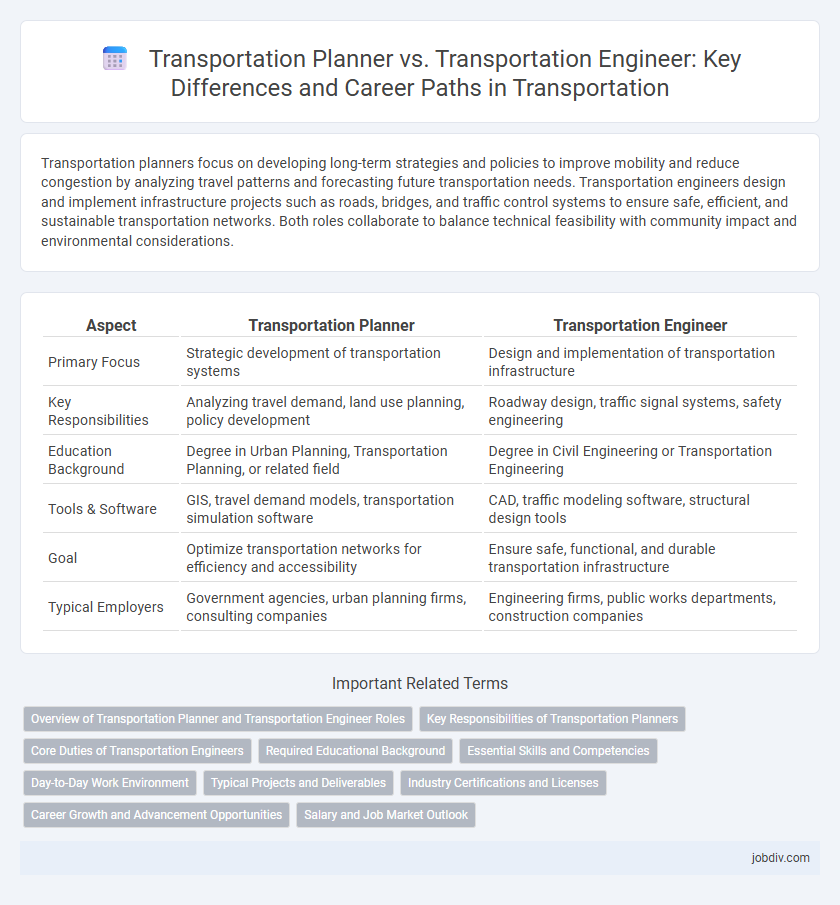Transportation planners focus on developing long-term strategies and policies to improve mobility and reduce congestion by analyzing travel patterns and forecasting future transportation needs. Transportation engineers design and implement infrastructure projects such as roads, bridges, and traffic control systems to ensure safe, efficient, and sustainable transportation networks. Both roles collaborate to balance technical feasibility with community impact and environmental considerations.
Table of Comparison
| Aspect | Transportation Planner | Transportation Engineer |
|---|---|---|
| Primary Focus | Strategic development of transportation systems | Design and implementation of transportation infrastructure |
| Key Responsibilities | Analyzing travel demand, land use planning, policy development | Roadway design, traffic signal systems, safety engineering |
| Education Background | Degree in Urban Planning, Transportation Planning, or related field | Degree in Civil Engineering or Transportation Engineering |
| Tools & Software | GIS, travel demand models, transportation simulation software | CAD, traffic modeling software, structural design tools |
| Goal | Optimize transportation networks for efficiency and accessibility | Ensure safe, functional, and durable transportation infrastructure |
| Typical Employers | Government agencies, urban planning firms, consulting companies | Engineering firms, public works departments, construction companies |
Overview of Transportation Planner and Transportation Engineer Roles
Transportation planners analyze travel demand, land use, and environmental impact to develop efficient and sustainable transportation systems. Transportation engineers design, construct, and maintain infrastructure such as roads, bridges, and traffic control systems ensuring safety and functionality. Both roles collaborate to optimize mobility, with planners focusing on strategic planning and policy, while engineers emphasize technical design and implementation.
Key Responsibilities of Transportation Planners
Transportation planners analyze travel demand, land use patterns, and environmental impacts to develop efficient transportation systems. They coordinate with stakeholders to create long-term plans that improve public transit, reduce congestion, and promote sustainable mobility. Key responsibilities include data collection, modeling traffic flow, and policy development for urban and regional transportation projects.
Core Duties of Transportation Engineers
Transportation engineers focus on designing, constructing, and maintaining transportation systems such as roads, bridges, and traffic signals to ensure safety and efficiency. They analyze traffic patterns, develop infrastructure plans, and apply engineering principles to solve complex transportation challenges. Their core duties include conducting feasibility studies, preparing technical reports, and implementing innovative technologies to optimize transportation networks.
Required Educational Background
Transportation planners typically require a bachelor's degree in urban planning, geography, or civil engineering with a focus on transportation systems and policy analysis. Transportation engineers need a bachelor's degree in civil engineering or a related engineering discipline, often supplemented by coursework in traffic engineering, infrastructure design, and transportation safety. Both roles may benefit from advanced degrees or certifications, such as a master's in transportation planning or Professional Engineer (PE) licensure, to enhance technical expertise and career prospects.
Essential Skills and Competencies
Transportation planners excel in spatial analysis, urban development, and public policy formulation, utilizing Geographic Information Systems (GIS) to design efficient transit solutions. Transportation engineers focus on traffic flow optimization, infrastructure design, and safety analysis, applying principles of civil engineering and software tools like AutoCAD and SYNCHRO for roadway modeling. Both roles require strong problem-solving skills, proficiency in data analysis, and an understanding of environmental and regulatory standards to ensure sustainable transportation systems.
Day-to-Day Work Environment
Transportation planners primarily focus on developing and implementing long-term transportation strategies by analyzing traffic patterns, land use, and community needs, often working in office settings with GIS software and planning tools. Transportation engineers concentrate on designing, constructing, and maintaining transportation infrastructure, spending significant time on-site overseeing projects and conducting technical assessments. Both roles collaborate closely but differ in their daily environments, with planners rooted in strategic forecasting and engineers engaged in hands-on technical execution.
Typical Projects and Deliverables
Transportation Planners typically develop travel demand forecasts, land use impact analyses, and multimodal transportation plans aimed at optimizing traffic flow and community accessibility. Transportation Engineers focus on designing, implementing, and maintaining infrastructure projects such as roadway alignments, traffic signal systems, and safety improvements to meet technical and regulatory standards. Key deliverables from planners include comprehensive mobility studies and policy recommendations, while engineers provide detailed design drawings, construction specifications, and performance evaluation reports.
Industry Certifications and Licenses
Transportation Planners typically hold certifications such as the American Institute of Certified Planners (AICP) credential, which validates expertise in urban and regional planning. Transportation Engineers often require Professional Engineer (PE) licensure, ensuring competence in designing and maintaining transportation infrastructure. Both roles benefit from specialized certifications like the Certified Transportation Planner (CTP) or certifications from the Institute of Transportation Engineers (ITE) to enhance industry credibility.
Career Growth and Advancement Opportunities
Transportation planners focus on strategic development and policy-making to optimize transit systems, offering career growth in urban planning agencies and governmental organizations. Transportation engineers specialize in designing and maintaining infrastructure, with advancement opportunities in engineering firms and public works departments. Both career paths offer growth through certifications and advanced degrees, but planners often move into higher-level administrative roles while engineers progress toward technical leadership positions.
Salary and Job Market Outlook
Transportation planners typically earn between $60,000 and $90,000 annually, with job growth projected at 7% over the next decade due to increasing urban development and sustainability initiatives. Transportation engineers command higher salaries, ranging from $75,000 to $110,000, driven by demand for infrastructure modernization and smart transportation systems. Strong job market outlooks for both roles reflect expanding investments in transportation infrastructure and evolving mobility technologies.
Transportation Planner vs Transportation Engineer Infographic

 jobdiv.com
jobdiv.com